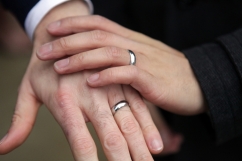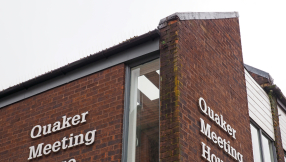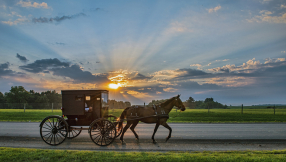
British Baptists could be facing a bruising controversy over homosexuality, as one of the regional associations has dissented from the denomination's declared position, Christian Today can reveal.
The West of England Baptist Association (WEBA) – one of 13 regional associations of the Baptist Union of Great Britain – has effectively challenged guidance issued by the Union which says each minister can make up its own mind on the issue of same sex marriage.
The matter of what is and isn't allowed is complex for Baptists because of the way they are structured: each Baptist church is independent, but the Union is responsible for setting national standards for the conduct of ministers.
After same-sex marriage was introduced in the UK, the Union issued guidance at its Assembly last year.
They had options – they could have threatened to have withdrawn the accreditation of a minister who performed a same-sex marriage, but this would effectively have meant deciding a church's theology for it.
Ultimately, the Union decided it cannot forbid churches from registering for same-sex marriages (if they want to) because of the Baptist 'Declaration of Principle'.
This is a sort of Baptist constitution which says that "each Church has liberty, under the guidance of the Holy Spirit, to interpret and administer [Christ's] laws".
So the Union's guidance said ministers who conducted same-sex marriages wouldn't be disciplined for doing so.
But it also asserted a traditionalist view of marriage as "a union between a man and a woman, as the continuing foundation of belief in our Baptist Churches" – and said that while ministers might be able to celebrate a same-sex marriage for someone else, they wouldn't be able to enter into one themselves.
THE WEST OF ENGLAND ASSOCIATION
However the West of England Association appears to have flouted this guidance, and attempted to outlaw its churches from conducting gay marriages.
Its trustees issued its own statement to churches last summer, circulated in a prayer letter from the regional minister team leader, Rev Nigel Coles.
The trustees were severely critical of the Union's position, not just because of its inconsistency, but because, they said, it was unbiblical.
They suggested that "unity was the primary objective at the cost of biblical integrity", "the issue here is not about homosexuality per se, but about the Bible", and the Union's statement "appears to reduce the place of the Bible in decision-making".
The same-sex marriage issue could be deeply divisive, WEBA says, adding: "We are not prepared to sit down quietly and simply watch this happen. We are aware a number of churches would seriously consider leaving BUGB altogether unless a clearer understanding is reached."
One clause in the statement seems to challenge directly the Union's position.
It appears to say that it would refuse outright permission for any church held by the WEBA Trust Company (the ultimate 'owner' of most of the churches in its region) to be used for a civil partnership ceremony.
In 2007, there was a request for a redundant church to be used for the blessing of a civil partnership; the request was refused. The trustees say that in line with that decision, "The WEBA Trust Company does not give permission for any building for which we are the holding Trustees to be used for such purposes."
And are all churches within WEBA in agreement on this? No. For at least one, this statement was a clear challenge to the autonomy of the local church – which the Union's guidance had been designed to safeguard.
In December 2014 the deacons at Tyndale Baptist Church in Bristol wrote to the chair of the WEBA trustees, Rev Steve Robinson, challenging their authority to impose their views on all the churches.

Robinson's response in February 2015 did not address the question of whether WEBA is legally allowed to forbid churches from holding same-sex marriages. However, on Tyndale's main point – that in the WEBA trustees' opposition to same-sex marriage they have trespassed upon Baptist autonomy – Robinson refers to an implied 'covenant' between Baptist churches.
He says that while it's normally assumed that each church has the 'right' to go its own theological way, there are occasions where a decision on a "significant issue" will lead to a breaking of this covenant. "We believe that this matter has to be seen in that light," he says.
Robinson concludes that since the general consensus among Baptists and in the wider Church is against same-sex marriage, unilateral decisions by individual churches are "breaking the wider covenant" with the Baptist Union.
Tyndale's minister and deacons are due to meet with Robinson for further discussion. However, Tyndale's minister, Rev Michael Docker, told Christian Today: "The response made some things clear, but did not adequately account for how the WEBA trustees are interpreting the Declaration of Principle."
He added "We contend that the freedom it gives to each church is a fundamental principle, without which Baptist identity would be completely undermined."
THE QUESTIONS STILL REMAINING
So: are the WEBA trustees really able to make such a decision? Robinson did not respond to requests for clarification and Rev Nigel Coles declined to be interviewed.
However, at a number of points WEBA's position is open to question. The responsibility of its trust company, for example, is to see that churches don't transgress the terms of their trust deeds; as no Baptist church has it written anywhere in its trust deed that it can't be used for a same-sex wedding, it is extremely doubtful that WEBA could stop it happening.
Its statement also makes some theological assumptions. It repeatedly appeals to the Bible to justify its stance, but in a way that implies that people who don't hold the same position simply ignore the Bible.
The statement also says that the trustees "Re-affirm our commitment to an evangelical understanding of the nature of marriage." Amen to that, but this is clearly aimed at a rejection of same-sex marriage – and there are a good number of people who would claim to be evangelicals and who support it.
In 1971 there was a major controversy in the Baptist Union after the Baptist academic Rev Dr Michael Taylor gave an address in which he seemed to say that Christ was not divine. A few churches did leave, but ultimately what came out at the following year's assembly was a strong and unequivocal reaffirmation of orthodox and evangelical doctrine.
There was also a crucial rejection of an amendment which called for the discipline of those who denied or contradicted the Union's Declaration of Principle. The hardliners who wanted to everyone to either subscribe to a rigid definition of Baptist orthodoxy or be suspended, were defeated.
What that event seems to say is that Baptists are an orthodox and evangelical denomination, but that they are not intolerant of those who are not quite so orthodox or evangelical – and if orthodoxy about same-sex marriage is more important than orthodoxy about the incarnation, Baptists are in a very strange place.
So far WEBA is the only Association to have come out publicly against the Union's position, and whether its churches and ministers are of the same mind as the trustees is not known.
The Union provided a statement in response to questions about this article. Rev Stephen Keyworth, who leads on the issue, said that all Christian denominations were "taking time to respond" to the new legislation. "We are all tackling this in a way that reflects our ecclesiology and governance structures," he said. "For Baptists that means engaging with local ministers and congregations, encouraging conversation and listening to each other as we seek the mind of Christ as we would on any issue.
"We are clear of our need to ensure that anything we do is faithful to our Christian discipleship as expressed through our Declaration of Principle and grounded in the local church. In the meantime we continue to affirm Christian marriage as the foundation of belief and practice for Baptists."
In her address to last month's Baptist Union Council meeting, General Secretary Rev Lynn Green listed the Union's priorities for 2020. Among them was that it would "navigate well the issues of human sexuality and find a settled place".
Baptists have, in theory, the sort of ecclesiology that should let them handle difference well. As things stand, though, that place is far from settled.












